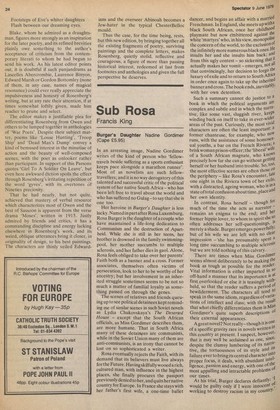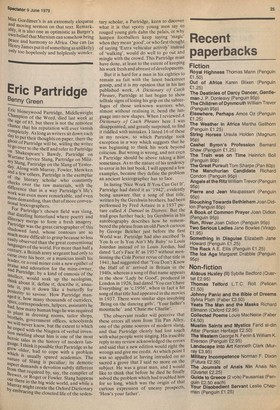Sub Rosa
Francis King
Burger's Daughter Nadine Gordimer (Cape £5.95) In an arresting image, Nadine Gordimer writes of the kind of person who 'fellowtravels beside suffering as a sports enthusiast keeps pace alongside a marathon runner'. Most of us novelists are such fellowtravellers; and it is no way derogatory of this talented and successful critic of the political system of her native South Africa — who has been left free to travel about the world and who has suffered no Gulag— to say that she is one too.
Her heroine in Burger's Daughter is less lucky. Named in part after Rosa Luxemburg, Rosa Burger is the daughter of a couple who have maintained a life-long dedication to Communism and the destruction of Apartheid. While she is still in her teens, her brother is drowned in the family swimmingpool, her mother succumbs to multiple sclerosis, and her father dies in gaol. Alone, Rosa feels obliged to take over her parents' Faith both as a banner and a cross. Former associates, themselves often victims of persecution, look to her to be worthy of her ancestry; but her involvement in an inherited struggle sometimes seems to be not so much a matter of familial loyalty as something passed on through the genes. The scenes of relatives and friends queuing up to see political detainees kept reminding me of similar scenes in such Soviet novels as Lydia Chukovskaya's The Deserted House — except that the South African officials, as Miss Gordimer describes them, are more humane. That in South Africa many of these detainees are communists, while in the Soviet Union many of them are anti-communists, is an irony that cannot be lost on so sophisticated a writer.
Rosa eventually rejects the Faith, with its demand that its believers must live always for the Future. Having skilfully wooed a rich, cultured man, with influence in the highest places, she finally procures the passport previously denied to her, and quits her native country for Europe. In France she stays with her father's first wife, a one-time ballet dancer, and begins an affair with a married Frenchman. In England, she meets upwith black South African, once her childhood playmate but now embittered against the white 'martyrs' who, in his view, monopolise the concern of the world, to the exclusion of the infinitely more numerous black ones. fle insults her and she insults him back; and a from this ugly contest — so sickening that it actually makes her vomit — emerges, not all that convincingly, her decision to forgo the luxury of exile and to return to South Africa in order once again to take up the inherited banner and cross. The bookends, inevitably, with her own detention.
Such a summary cannot do justice to a book in which the political arguments are complex and subtle and in which the narra tive, like some vast, sluggish river, keePs winding back on itself to take in ever-wider areas of the past. Curiously, the most vivid characters are often the least important: a former chanteuse, for example, who now runs, with the assistance of some homosex ual youths, a bar on the French Riviera; a brisk woman prison-officer;t he 'liberal' wife of a South African magnate, who knoWs precisely how far she can go without getti08 herself or her husband into trouble. So, too, the most effective scenes are often those on the periphery — like Rosa's encounter, late one night in the Riviera town of her exile, with a distracted, ageing woman, who is inaj state of total confusion about time, place an her own identity. In contrast, Rosa herself — though for much of the time she acts as narrator remains an enigma to the end; and her former hippie lover, to whom in spirit she s° often addresses her self-questionings, is merely a shade. Burger emerges powerfullY; but of his wife we are left with no clear impression — she has presumably spent 3 long time succumbing to multiple sclerosis but we are told nothing of this calvary. There are times when Miss Gordimer seems almost deliberately to be making the book as tough as possible for the reader. Vital information is either imparted in 5° off-hand a manner that its importance is at first overlooked or else it is teasingly with held, so that the reader suffers a period 0' bewilderment. The characters all tend t° speak in the same idiom, regardless of variations of intellect and class; with the result that what chiefly differentiates them is Miss Gordimer's quite superb descriptions of their external appearances. A great novel? Not really— though it is one of a specific gravity rare in novels written ill this country at present. I suspect, however, that it may well be acclaimed as one, since, despite the clumsy lumbering of its narra tive, the tortuousness of its style and 45 failure ever to bring its central character into proper focus, it deals, with abundant intel ligence, passion and energy, with one of the, most appalling and intractable problems °I our times.
At his trial, Burger declares defiantly: would be guilty only if I were innocent or, working to destroy racism in my country. Miss Gordimer's is an extremely eloquent and moving sermon on that text. Remarkably, it is also one as optimistic as Burger's OW n belief that Marxism can somehow bring Peace and harmony to Africa. One can (as Henry James put it of something as unlikely) only too hopelessly and helplessly wonder.











































 Previous page
Previous page